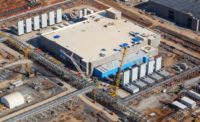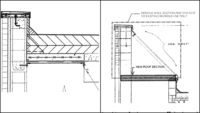The project to install a suicide-deterrence net and perform other upgrades on the Golden Gate Bridge in San Francisco now is expected to complete five years late and cost more than double the original contract price, its contractors say. The joint venture leading the project filed a breach-of-contract complaint against the agency that manages the bridge seeking $195 million in damages, while the agency counters that delays were caused by changes in the contractor’s ownership.
Shimmick/Danny’s Joint Venture, made up of Shimmick Construction Co. Inc. and steel erection contractor Danny’s Construction Co. LLC, is the project prime contractor for the Golden Gate Bridge, Highway and Transportation District. Under a $142-million contract signed In 2017, the project was originally slated to finish by early 2021. The contractor says it now expects to complete work in 2026 at a cost of $398 million—blaming the district for delays and overruns.
The district “seeks to hold [the contractor] hostage and have it complete the work with no adjustment in price,” the joint venture firms allege. Their claims were filed in a cross-complaint of a case originally filed against them last year by Vigor Works LLC, a structural steel supplier that says it is still owed millions of dollars for the project.
The project includes building a physical suicide deterrent system with 385,000 sq ft of marine-grade stainless steel net stretched across 555 tons of steel supports that hold the net 20 ft out and 20 ft below both sides of most of the bridge’s 1.7-mile span. The plan also calls for construction of wind retrofits to account for the increased aerodynamic profile and wind load, and removal and replacement of a “traveler” system used to access the bridge underside for maintenance. A modernized electric traveler would replace a diesel-powered system from the 1950s, and its new running rails would allow for the net to be installed under the bridge.
The joint venture says it was unaware of bridge deterioration that has inhibited the team's ability to perform work. It initially priced the work lower than it would have if it had been aware of the span’s condition. Records show the joint venture was the lower of two bidders for the project with its $142-million price. The other bidder, American Bridge Co., bid $172 million.
“We were alarmed to discover the district concealed significant information during the proposal phase of the project, including extensive deterioration in certain areas of the bridge, which impacted [the joint venture’s] ability to perform its work,” a Shimmick Construction spokesperson said in a statement.
The contractors say the bridge district “concealed significant information” about the deterioration during the bidding process, and that prospective bidders were given access only to limited parts of the bridge during walk-throughs, and were not allowed to shoot photos in areas that were not accessible to the public or to take measurements.
Details about the deterioration also were redacted from publicly available copies of state court records in San Francisco, where the lawsuit was filed.
The agency is “deeply frustrated by the contractor’s slow pace of construction and multiple delays building the suicide barrier,” said Paolo Cosulich-Schwartz, a bridge district representative, in a statement. “The district has been transparent with Shimmick about the condition of the bridge throughout the project.” He added that the district would continue working with the contractor “to complete this life-saving project as quickly as possible.”
Cosulich-Schwartz attributed delays to two changes in Shimmick ownership since the contract award in early 2017. Soon after, AECOM announced it would buy Shimmick in a deal valued at $175 million, and in early 2021, investment firm Oroco Capital closed on a purchase of the contractor and other civil construction businesses from its former parent for an undisclosed price.
The contractors say in their complaint that the district caused delays and overruns in several ways.
Flaws in the agency design for the traveler's rail chair and the bridge wind fairing forced the contractor to abandon a “carefully thought-out and efficient plan” and decouple work on the top of the bridge from work on the bottom, slowing construction and adding costs. The joint venture firms assert that the district required an “unnecessary” scaffolding standard that was more expensive, slower and less efficient, and it also refused to pay the team's increased costs.
Also, the firms claim, material for the travelers was not available from a domestic producer, but the district did not obtain a Buy America Act waiver from the Federal Highway Administration until 2022—preventing work on portions of the project from beginning until after the originally scheduled completion date.
“Rather than address these issues, the district has stubbornly refused to take responsibility,” Shimmick’s spokesperson said. “We do not take this action lightly.”
An attorney for Vigor Works did not immediately respond to inquiries about the case.
The joint venture says it now expects to complete the suicide deterrent net in 2023 and anticipates finishing the final piece of the project, the travelers, in early 2026.
The National Suicide Prevention Lifeline is a hotline for individuals in crisis or for those looking to help someone else. To speak with a certified listener, call 1-800-273-8255 or text HOME to 741741.






Post a comment to this article
Report Abusive Comment